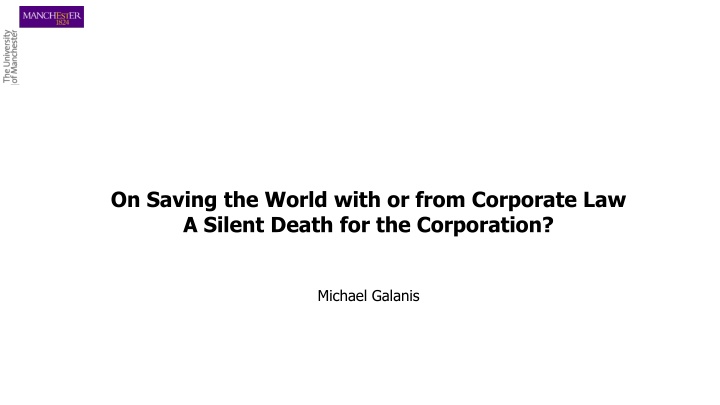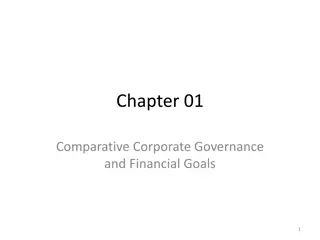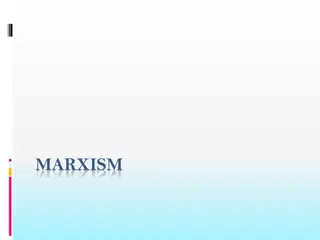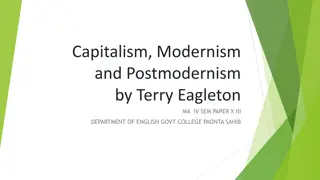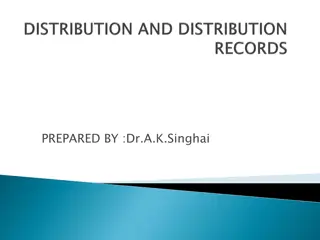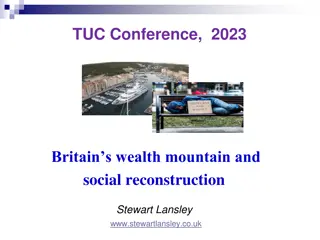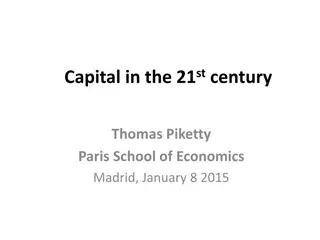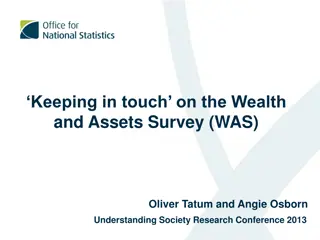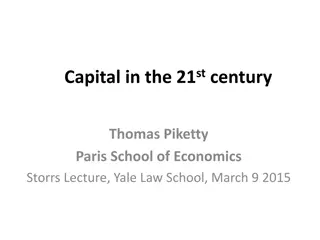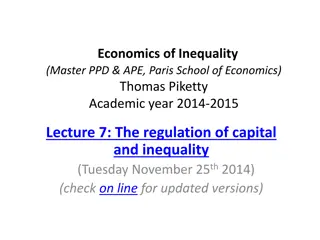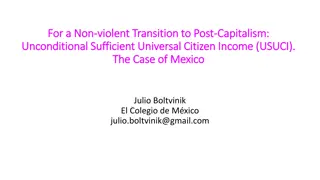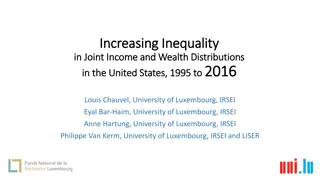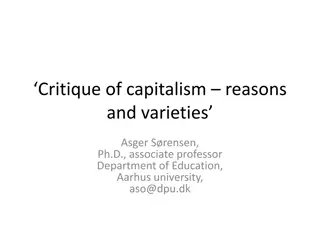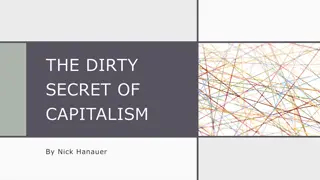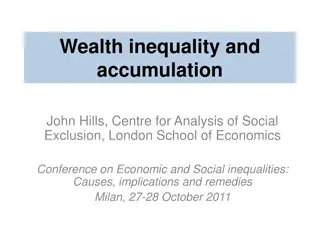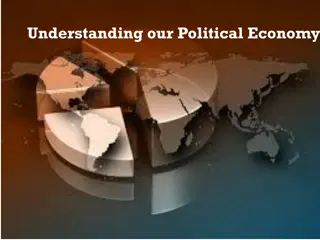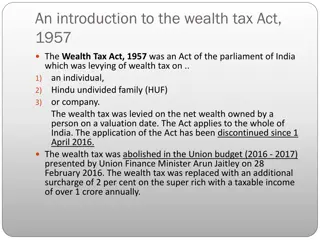The Role of Corporate Law in Wealth Distribution and Capitalism
Exploring the evolution of corporations within capitalist frameworks, this analysis delves into the intertwined concepts of managerialism, infinite wealth accumulation, and the social-historical embeddedness of corporations. Through historical contexts and theoretical perspectives, the discussion delves into how corporate goals have shifted towards profit maximization and asset-price speculation, ultimately shaping modern capitalism.
Download Presentation

Please find below an Image/Link to download the presentation.
The content on the website is provided AS IS for your information and personal use only. It may not be sold, licensed, or shared on other websites without obtaining consent from the author.If you encounter any issues during the download, it is possible that the publisher has removed the file from their server.
You are allowed to download the files provided on this website for personal or commercial use, subject to the condition that they are used lawfully. All files are the property of their respective owners.
The content on the website is provided AS IS for your information and personal use only. It may not be sold, licensed, or shared on other websites without obtaining consent from the author.
E N D
Presentation Transcript
On Saving the World with or from Corporate Law A Silent Death for the Corporation? Michael Galanis
T. Piketty (2013), Capital in the Twenty-First Century unequal wealth distribution.
P. Ireland (1996) Capitalism without the Capitalist : the corporation symbolises industrial capital
Social-historical Embeddedness of the Corporation Antiquity Mercanitilism Corporation as a (quasi-)public organisation Early Capitalism Late 18thcent. 1840s: Private Partnership / Trust & still state-controlled Corporation 1840s: Corporation privatized Corporate capitalism 1840 1980s: Chandler (1990), Scale & Scope => Corporate Bureaucracy - M-Form - Subsidiarisation 1980s 21stcent.: Financialised & commodified corporation STILL Corporate Bureaucracy 1. The Corporation and its goals are (re)conceptualised by social-historical context (Paddy is partly correct)
Bureaucratic Corporation & Infinite Wealth Accumulation Primary Goals of Corporate Bureaucracy within Capitalism Managerialism : Growth in scale & scope (Sales Revenue) Financialized Managerialism: Growth & Asset-Price Speculation (Growth vs Profit) 2. Within capitalism the corporate goal has been aligned with infinite wealth accumulation Causal link between managerialism and infinite accumulation?
Bureaucratic Corporation & Infinite Wealth Accumulation Max Weber, The Protestant Ethic and the Spirit of Capitalism (1905) [ ] the earning of more and more money [ ] is thought of so purely as an end in itself, that from the point of view of the happiness of, or utility to, the single individual, it appears entirely transcendental and absolutely irrational. Man is dominated by the making of money, by acquisition as the ultimate purpose of his life. Economic acquisition is no longer subordinated to man as the means for the satisfaction of his material needs. This reversal of what we should call the natural relationship, so irrational from a na ve point of view, is evidently as definitely a leading principle of capitalism as it is foreign to all peoples not under capitalistic influence. [ ] But capitalism is identical with the pursuit of profit, and forever renewed profit, by means of continuous, rational, capitalistic enterprise in a wholly capitalistic order of society. For it must be so: an individual capitalistic enterprise which did not take advantage of its opportunities for profitmaking would be doomed to extinction. [emphasis added] Disenchantment and the prevalence of instrumental (economic) rationality e.g. slave labour is efficient
The Stable Anatomy of Corporate Law & the Spirit of Capitalism Corporate personality Limited liability Directors Duties & Governance Structure Share as a transferable instrument 1. (Privatised) Corporate Law s fit with infinite wealth accumulation 2. Key factor/organisational tool for the emergence of bureaucratic capitalism
Impact of Corporate Bureaucratisation: Accusations & Justifications Weberian ideal-type & instrumental rationality Bureaucracy as such is a precision instrument which can put itself at the disposal of quite varied, purely political as well as purely economic, or other sort of interests of domination. (Weber, Economy and Society, 1922) Heterodox critique & bureaucratic irrationality - Procedural divergence from (instrumental) rationality - Consumerism (e.g. Herbert Marcuse) and economic determinism - Closure of meaning through formalisation and exclusion of alternatives (e.g. B. Hibou) - Destruction of meaning by treating qualitative differences as quantitative (C. Castoriadis) 3. Corporate bureaucracy is a (not perfect) driver of instrumental rationality, BUT 4. Within corporate capitalism Weber s instrumentality claim is reversed and creates a feedback loop of economic determinism
Impact of Corporate Bureaucratisation: Accusations & Justifications Hamel & Zanini (2016) Deloite Australia (2014) Relative growth of managerial employment versus other occupations in the US Share of time spent on internal rules (rather than government rules)
Corporate Law Theory Justifications a Meaningless Debate Traditionalists vs Progressives - Private vs public corporate law (mandatory vs default) - Shareholder primacy vs stakeholders/CSR Common ground: - Objective of infinite wealth accumulation retained - Instrumental rationality (e.g. stakeholderism for sustainable growth) - Corporate governance is a distributional problem 5. Normative issue unreflexively presumed as an economic one, i.e. part of the determinist loop of infinite wealth accumulation
Breaking the Loop of Economic Determinism? Social imaginary Castoriadis (1975) - Psyche is socialized/determined but never fully ( radical imagination ) - Central significations give meaning to everything (systemic logic) - Societies are self-instituting and self-instituted - Instituted vs Instituting Society: Social autonomy Capitalism s Deeper Origins are in the Human Psyche - Fear of finite existence and Pseudo-mastery as omnipotence - Perpetual accumulation (of capital)
Breaking the Loop of Economic Determinism? Modern pseudo-rationality is one of the historical forms of the imaginary; it is arbitrary in its ultimate ends to the extent that these ends themselves stem from no reason, and it is arbitrary when it posits itself as an end, intending nothing but a formal and empty rationalization . (Castoriadis, 1987) Capitalism in not merely religiously conditioned as Weber thought, but rather is an essentially religious phenomenon. (Walter Benjamin, Capitalism as Religion , 1922 )
Breaking the Loop of Economic Determinism? Imagery of economic dogma - Market as the naturally original state of affairs - Homo Oeconomicus: an a-social, a-historical being - Economic rationalisation is transcendental (Social Heteronomy) - Corporation reconstituted in accordance with the signification of pseudo-mastery Marxist economic determinism not very helpful either 6. It is not about ascertaining wealth accumulation and fair distribution, but about why this option instead of others (Piketty asked the wrong question)
Breaking the Loop of Economic Determinism with Corporate Law? The Preconditions 1. Accept the corporation is always conceived within the social-historical, so subject to constant transformation 2. Avoid quasi-religious corporate law debates by accepting the open- endedness of the corporation s social objective(s) 3. Deal with how corporate objectives should be determined and modified so as to ensure (2) above Can we retain bureaucratic elements?
Breaking the Loop of Economic Determinism with Corporate Law? The Possibilities 1. Continue as it is and hope for the best? 2. Mitigate distributional problem (e.g. progressive approach)? 3. (Re-)politicize and democratize? (democracy vs bureaucracy) 4. Silent death via anti-bureaucratic/post-capitalist alternatives?
